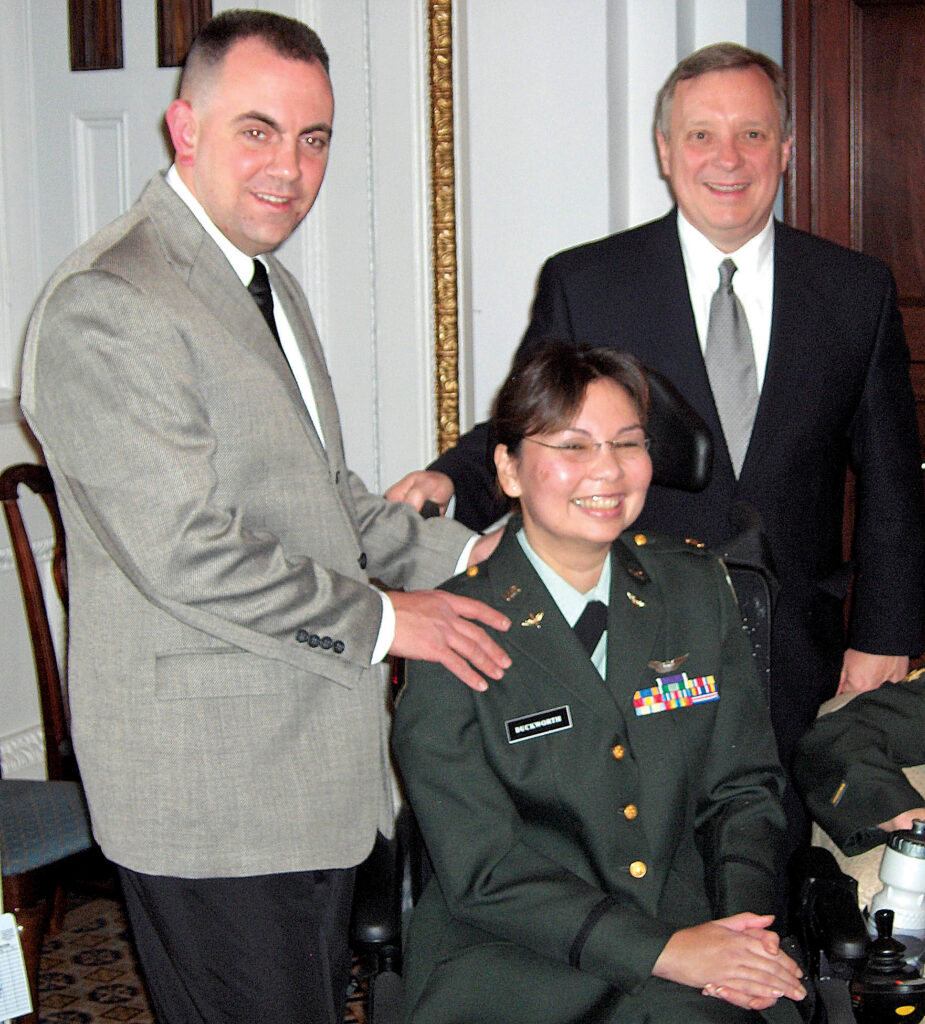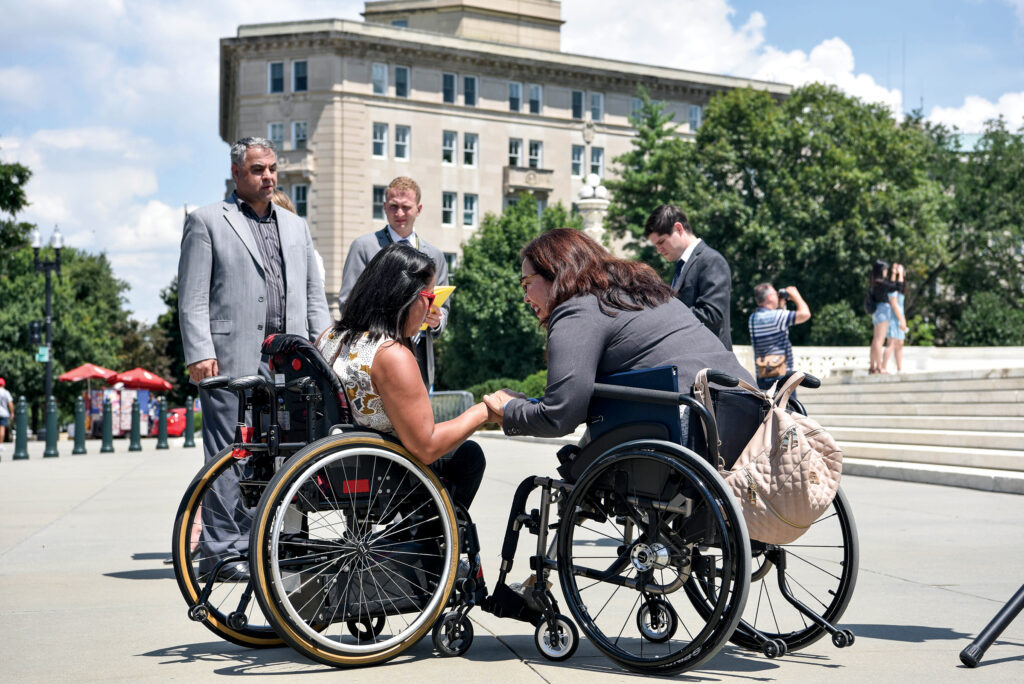By Élan Young
In 2004, when US Army Captain Tammy Duckworth, now a senator from Illinois, woke up at Walter Reed Army Medical Center after the Black Hawk helicopter she was co-piloting was shot down in Iraq, she found herself in unrelenting, all-consuming pain. She remembers realizing that she was suddenly mission-less—a helicopter pilot with no legs.
Duckworth grew up in Southeast Asia while her father, an Army and Marine Corps veteran who served in World War II and the Vietnam War, worked for the United Nations and international companies on behalf of refugees. Military service is a family legacy; her family has fought in every major US conflict since the American Revolution. When Duckworth joined the military, she intended to serve for the rest of her professional life. But as she lay in a hospital bed, she grappled not only with the loss of her legs, but also with the loss of a dream.

FROM WAR TO PUBLIC SERVICE
While recuperating at Walter Reed, she was visited by Sen. Dick Durbin from Illinois who gave her his personal number, telling her to call him if she needed anything. She took him at his word, thus beginning her transformation into an advocate, which took shape as she called him again and again on behalf of other service members and their families who needed help getting care or benefits.
“This experience taught me that I could continue serving my fellow troops by advocating for them in Illinois and Washington,” she says. “To this day, I am grateful that Sen. Durbin never saw me as pitiful or broken, but as someone who could help make our nation better by running for Congress.”
Eight years after Duckworth became the first female double amputee from the war in Iraq, she became the first disabled woman to be elected to the US House of Representatives. In 2017, she was elected to the US Senate.
With this new platform, Duckworth has blazed a trail of firsts: She is the first Thai American woman elected to Congress, the first person born in Thailand elected to Congress, the first female double amputee in the Senate, and the first senator to give birth while in office.

Becoming a wounded veteran showed Duckworth the glaring gaps in the medical treatment of veterans, but being a female wounded veteran showed gaps between male and female service members.
“Significant work remains to be done to make VA hospitals, medical centers, and clinics more responsive to the needs of female veterans and veterans that have lost limbs,” she says.
As a senator, she has focused her legislative and oversight efforts on pushing the VA to accelerate its efforts to provide better care specifically targeted to the unique needs of female and amputee veterans.
When the VA has not responded adequately, she has authored and introduced legislation, such as the Access to Contraception Expansion for Veterans (ACE Veterans) Act, which would require the VA to provide a year’s supply of contraception upon request of a veteran. She also introduced bipartisan legislation, the Veterans Preventive Health Coverage Fairness Act, which would eliminate the double standard in federal law that results in VA patients being the only Americans with health insurance coverage who are required to pay copays for preventive medicines. Finally, she is also a co-sponsor of the Deborah Sampson Act, which would improve VA services and access for female veterans, eliminating barriers to care and services that many of them face.

ADA CHAMPION
In March, Duckworth was awarded the ADA Legacy Award from the American Association of People with Disabilities. Not only has she sought to expand legislation protecting people with disabilities, keep government accountable, and make it easier for business to comply with the Americans with Disabilities Act (ADA), she also led efforts to block a bill that would have gutted enforcement of the ADA.
“The business community has had three decades to comply with the ADA and make their facilities fully accessible for all,” she says. “It’s astounding that instead of investing their time and resources on increasing accessibility, they launched a PR campaign to convince Congress to sanction discrimination by gutting enforcement of the landmark bill.”
With this threat to the ADA, Duckworth sprang into action to secure support from 42 of her colleagues in the Senate to make it clear that they would reject any effort to weaken the ADA’s enforcement authorities.
“These senators united with me in recognition that the real challenge facing our nation is not only complying with the letter of the law, but fulfilling the spirit of the ADA to make public accommodations accessible to all Americans,” she says.
“We must fully implement and strengthen the ADA, a law that was passed 30 years ago but still has not been fully implemented. I’ve introduced a common-sense alternative bill that would make it easier for small businesses to comply with the ADA and become accessible for people with disabilities by doubling the maximum tax credit for renovations and allowing more small businesses to receive the credit.”
Duckworth also advocated for people with disabilities to have improved quality of life through access to fitness centers. She introduced the Exercise and Fitness for All Act, a bill that would make fitness facilities across America more accessible for those with disabilities by establishing new federal guidelines to help ensure people with disabilities have the same opportunity to use fitness facilities as their nondisabled peers.
“No one should be denied the ability to lead a healthy lifestyle because they have a disability, but many exercise gyms and fitness facilities across our country are not accessible for people with disabilities and do not comply with federal rules,” she says. “I know firsthand how frustrating this problem is, which is why I introduced this bill.”
As an advocate for people with disabilities, Duckworth also has her eye on skyrocketing medical expenses, including prescription drug costs, that too often hit the disability community the hardest.
“I’m proud to support the Choose Medicare Act, which, along with giving every individual who is not already eligible for Medicaid or Medicare the opportunity to enroll in Medicare, also directs Medicare to negotiate fair prices for prescription drugs,” says Duckworth. “Let’s build on the progress made by the Affordable Care Act by increasing competition to lower costs.”
EMPOWERED AND ENGAGED
As a senator, Duckworth sees the impact that her constituents can make when they decide to engage in politics. As a person with a disability, Duckworth reminds others in the community how important their individual and collective voices are in shaping a more equitable and accessible world.
Even when people can’t make it to the Capitol, Duckworth says that there is power in contacting your congressperson.
“Without everyday Americans calling and writing their representatives and showing up to pressure them in person, millions of Americans would have likely lost their healthcare,” she says about protests to keep the Affordable Care Act.
With an eye for the future, Duckworth wants to make sure voting is easy and accessible, especially for vulnerable populations who might not show up during the COVID-19 pandemic.

“Many people with disabilities have a hard time getting to the polls to begin with, which is why it’s critical that we expand vote by mail and early voting during an election year where the COVID-19 pandemic has created significant additional obstacles to voting,” she says. “That’s why I’m a proud co-sponsor of the VoteSafe Act, which would help ensure that everyone who is eligible to vote can do so in a way that’s secure, accessible, and safe.”
The needs of people with disabilities are often underrepresented. Through Duckworth’s platform and her commitment to the disability community throughout her legislative career, people with disabilities have a chance to gain broader public support for the issues that affect them.
NEWS FROM THE HILL

Duckworth Advocates for Accurate Data on Access to Prosthetic Devices
ON JULY 28, US Sens. Tammy Duckworth (D-Ill.) and Marsha Blackburn (R-Tenn.) introduced the Access to Assistive Technology and Devices for Americans Study Act—a bill that would require the Government Accountability Office to study access to prosthetic devices for people with limb loss.
The legislation would evaluate appropriate coverage of assistive technologies for amputees, especially prosthetic devices and custom orthoses. Among other things, it would look at affordability, rehabilitation services, timelines for assessment for surgery and assessment of assistive devices, matching specific devices with the needs of individual patients, and timely access to care, including educating patients about options.
“Americans with limb loss and limb difference face unique challenges in accessing the optimal assistive technologies that would greatly enhance quality of life and strengthen independence,” says Duckworth. “This bipartisan bill I’m introducing with Sen. Blackburn would make sure Congress receives a rigorous review of current practices as well as a set of recommendations on how we can improve patient access to the most effective assistive technologies, particularly prosthetic devices.”

Duckworth, a bilateral amputee and proponent of other legislation on behalf of people with disabilities, was recently rumored to be on Joe Biden’s shortlist of potential vice president nominees. Her being elected to Congress and considered as a candidate for vice president suggests that many voters now see people with disabilities as viable candidates for the highest offices of the nation.



